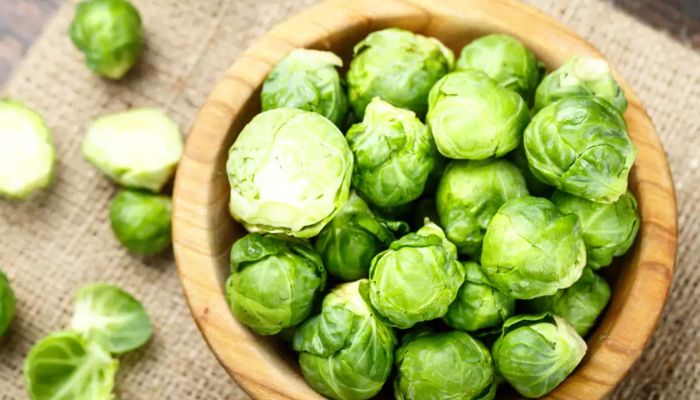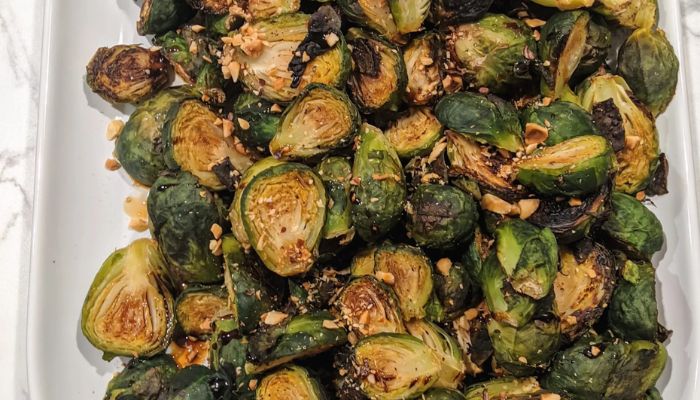Having worked as a nutritionist with more than 7 years of experience guiding clients toward better health via dietary adjustments, I am constantly searching for ways to make good eating more fun and accessible. The brussels sprout is one vegetable I often suggest; it’s low in calories, nutritious, and tastes great enough to be a great addition to many meals. I’ll offer ideas for cooking brussels sprouts in mouthwatering ways that will transform your dinners in this post along with my observations about them! Read “Brussels Sprouts: The Low-Calorie Veggie That Will Revolutionize Dinner” below carefully.
Table of Contents
What are Brussels sprouts?
Along with broccoli, cauliflower, kale, and cabbage, Brussels sprouts are members of the cruciferous vegetable family. They flourish on a stalk in bunches that mimic tiny cabbages.
Brussels sprouts got their name from Brussels, Belgium, their birthplace. Their cultivation began in the 13th century.
As more people see their dietary advantages, these vegetables have become rather popular recently. From stem to sprouted bud, the whole plant is nutrient-dense and edible.
Brussels Sprout Facts: Nutrition
Brussels sprouts are so beneficial for you for the following among other things:
- Low in calories; one cup of cooked brussels sprouts has about sixty calories. Eating them is a fantastic way to get nutrients and volume without loading up on calories.
- High in fiber: One cup’s worth offers four grams of dietary fiber. This advances gut health and digestion.
- Packed in minerals and vitamins: Brussels sprouts offer manganese, potassium, vitamin K, vitamin C, folate. Their great vitamin K content helps blood clotting by means of their action.
- Has antioxidants; Brussels sprouts include quercetin and kaempferol. These chemicals battle inflammation in the body and free radical damage.
- Promotes detoxification: Brussels sprouts’ sulfur-containing compounds and antioxidants help the liver detoxify, so shielding cells.
Given this excellent nutritional profile, it’s clear why I advise including brussels sprouts in a sensible diet!
Weight Loss Benefits of Brussels Sprouts
Low calorie and high fiber content of brussels sprouts are among the main reasons I advise them for weight loss.
Slowly moving through the digestive tract, fiber causes a prolonged sensation of fullness and satisfaction following meals. This can naturally help to lower calorie intake at meals and cut overindulgence.
Fiber also hooks itself to bile acids, which the body exparts. The liver draws cholesterol from the bloodstream to replace lost bile acids, so lowering cholesterol.
Just one cup of brussels sprouts contains 16% of the daily fiber needed for women and 10% for men. Fiber is your friend in weight loss efforts!
For a vegetable, Brussels sprouts are also rather high in protein. About 4 grams of protein are in a one-cup serving. Including more plant-based protein foods like brussels sprouts helps one cut back on meat and animal products, which typically have more fat and calories.
How to Cook Brussels Sprouts So They Taste Great
Brussels sprouts have many people’s negative reputations since they have only been boiled or overdone, so accentuating a strong, bitter taste. Brussels sprouts taste sweet, and nutty and have a nice texture when cooked right. These are my suggestions for preparing brussels sprouts to taste absolutely great:
- Brussels sprouts caramelize their natural sugars, so accentuating their sweetness. Toss halved sprouts with olive oil, salt, and pepper; roast at 400°F for 20 to 25 minutes.
- Cook stir fry or sauté. Cook halved or thinly sliced sprouts on the stovetop over medium-high heat using olive oil or butter for five to seven minutes until just browning. Their taste is improved by the strong heat.
- Grilling Brussels sprouts brings a wonderful charred taste. Toss in oil; grill over medium heat, turning occasionally, 10 to 12 minutes.
- Steaming Brussels sprouts until just tender then sautéing them afterward is a guaranteed way. Sauteing gives texture; the steaming softens them.
- Toss sprouts with lemon juice, diced pancetta or bacon, grated parmesan, chopped hazelnuts or almonds, or maple syrup after cooking. limitless choices of taste!
These cooking techniques will help you properly prepare Brussels sprouts so they become a delicious vegetable everyone will be returning for seconds!
Simple and Delicious Brussels Sprouts Recipes
These are some of my best brussels sprout dishes created for customers:
Toss Brussels sprouts with olive oil, salt, and pepper then roast them. Drizzle over the sprouts when they come out of the oven honey and balsamic vinegar whisked together. The glaze—sweet and sour—is really excellent.
Thinly slice Brussels sprouts and massage kale with lemon juice and olive oil. Shred Brussels sprouts and kale salad. Toss with feta, dried cranberries, toasted walnuts. This salad gets nutrients from the brussels sprouts and kale.
For a simple, low-fat takeout fakeout, stir fry brussels sprouts with rice, carrots, peas, eggs, soy sauce, and sesame oil. Brussels sprouts bring excellent nutrition and texture.
Saute-cut Brussels sprouts and potatoes together in a skillet until browned and crispy. For a filling hash, top with a fried egg.
Shred brussels sprouts and green apples; then, toss with a creamy apple cider vinaigrette. The sweet apples counter the slightly bitter sprouts.
These dishes all stress Brussels sprouts’ adaptability. Their subdued taste fits nicely with sweet, savory, and tangy foods. For an additional vegetable serving, they can be presented as a side or included into main courses.
Tips for Purchasing and Storing Brussels Sprouts
Look for brilliant green, firm brussels sprouts with small heads when shopping. Steer clear of sprouts having yellowed or loose outer leaves. To help maintain freshness, I advise buying sprouts still attached to the stalk wherever at possible.
Stored in a plastic bag in the refrigerator, uncooked brussels sprouts keep for three to five days. Wait to wash them till just before cooking to maximize their shelf life.
Refrigerated in an airtight container, cooked brussels sprouts keep two to three days. They also freeze for up to one year which nicely. Before freezing them for best texture, blanch sprouts.
Conclusion
Brussels sprouts are among my favorite vegetables to suggest as a nutritionist because of their great weight-loss advantages and nutritional profile. They have low calories, lots of nutrients and fiber, and elements that help detoxify.
Although Brussels sprouts have a bad image, cooked correctly they become sweet and mouthwatering. Great cooking techniques with best results are roasting, sautéing, grilling, and steaming.
With delicious dishes like Honey Balsamic Roasted Brussels Sprouts, Shredded Brussels Sprouts and Kale Salad, and Brussels Sprout Fried Rice, include Brussels sprouts into your diet. Their rather mild taste and texture make them quite flexible.
Brussels sprouts are a vegetable every one should be eating since they have great nutrition and crowd-pleasing taste when cooked right. Try my great brussel sprout recipes and cooking methods; I’m sure they will transform your dinners!

Lane is a seasoned nutrition expert with over 5 years of experience in guiding individuals toward healthier eating habits and sustainable weight management. Holding a degree in Nutrition Science, Lane specializes in personalized dietary plans that align with specific calorie limits, helping people achieve their fitness goals without sacrificing enjoyment. As the lead author at mycalorielimit.com, her approach is rooted in evidence-based practices and a deep understanding of nutritional needs, making her insights both reliable and practical. Connect with Lane on Instagram for daily tips and inspiration.

